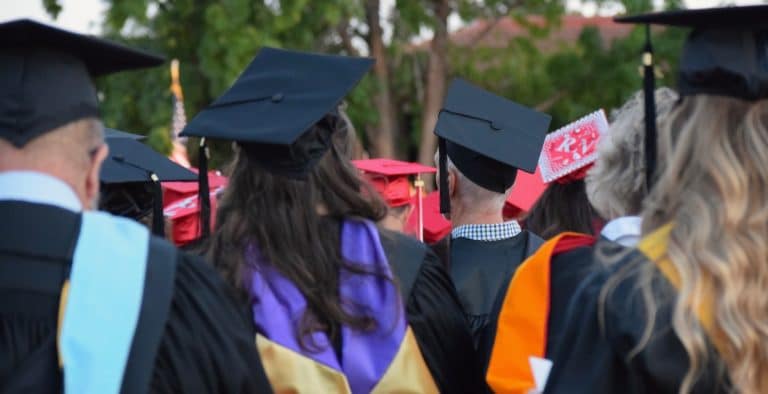
Australia is a popular destination for both Working Holiday Visas and tourists, however, it is also worth considering Australia as a destination for studying. Australia is renowned for its high-quality education system, vibrant multicultural society, and stunning natural landscapes, making it a top destination for international students. With a diverse range of universities offering a wide array of courses, Australia provides an enriching academic and cultural experience. The majority choose to study in Sydney or Melbourne; however, there are numerous universities in Australia to choose from, with courses offering a wide range of topics. This guide will explain everything you need to know about studying in Australia from fees to entry requirements.
Table of Contents
Why study in Australia?
World-Class Education
Australian universities consistently rank among the top in the world, thanks to their strong research capabilities, innovative teaching methodologies, and state-of-the-art facilities. Nine Australian universities rank in the global Top 100 (QS 2025).
The Group of Eight (Go8) is a coalition of leading research-intensive universities, includes prestigious institutions such as the University of Melbourne, Australian National University (ANU), and University of Queensland, among others (see complete list below). However, beyond the Go8, numerous other universities also offer excellent education and research opportunities across various fields.
Diverse Range of Courses
To study in Australia, you will need to get a student visa. It is not difficult to get it and it costs $710 (as at Feb 2024). You will receive a response to your application within 1-3 weeks. Just ensure you have attached the relevant documentation to your application to avoid any complications or delay. This visa will also allow you to work outside of your class hours; however, there are limitations. You can work up to 48 hours per fortnight and full time during school holidays.
Whether you’re interested in science, arts, technology, business, or any other field, Australian universities offer a plethora of courses to meet your academic and career aspirations. From undergraduate degrees to postgraduate programs and PhDs, the flexibility and diversity of the Australian education system allow students to tailor their studies to their specific interests and goals.
Support for International Students
Australia is committed to providing a supportive environment for international students. Universities offer a range of services, including orientation programs, language support, academic assistance, and counseling services. Additionally, the Australian government’s Education Services for Overseas Students (ESOS) framework ensures that international students receive a high level of education and support.
Vibrant Campus Life
Diverse campuses: From beachside in Perth to inner-city Sydney and tropical Queensland.
Studying in Australia is not just about academics; it’s also an opportunity to engage in a dynamic campus life. Universities host various clubs, societies, and events, allowing students to explore new interests, meet people from around the world, and immerse themselves in Australian culture. Sports, arts, and community service activities are also integral parts of the university experience. Safe cities, vibrant student communities and excellent healthcare.
Opportunities for Work and Research
International students in Australia have the opportunity to gain practical experience through internships, part-time jobs, and research projects. The country’s strong industry links and innovative research landscape provide students with valuable hands-on experience and networking opportunities. Post-study work visas also allow graduates to remain in Australia and work for a certain period, enhancing their global career prospects.
Need advice to study in Australia?
You may be hesitating on the visa you need, the steps to take, the school to choose or even the direction to take. It is vey easy to get lost …But do not panic, specialized organisations can help you. This is the case with Study Connection, which accompanies you for free in all your efforts to study in Australia. The costs are borne by the schools. And no need to have a clear plan, they are there to listen to you and advise you!
Contact them here: Study Connection

💸 10% Discount on your Insurance Policy
Find here all the information you need and get your 10% Go walkabout promo code for any policy.
Tuition Fees & Living Costs 2025
| Level | Annual Fees (AUD) | Living Costs (per year) |
|---|---|---|
| Bachelor’s degree | 28 000 – 45 000 | 20 000 – 25 000 |
| Master’s degree | 30 000 – 50 000 | 20 000 – 25 000 |
| PhD | 28 000 – 37 000 | 20 000 – 25 000 |
Tip: Melbourne and Sydney are at the top end; regional campuses (e.g. La Trobe Bendigo, UQ Gatton) can be 10–15 % cheaper.
Why are Australian universities so expensive?
A series of factors justify the high cost of universities in Australia:
- a fairly regular overhaul of programs to keep up to date with labour market trends
- carefully selected professors for their academic and professional renown
- state of the art premises including modern equipment (computers, laboratories, research centres, digital bookstores, etc.)
- opportunities for academic exchange in major universities around the world
- excellent sports clubs, art facilities, employment assistance services, accommodation, etc.
Choosing the Right University
Selecting the right university involves considering various factors, including the course offerings, location, campus facilities, and opportunities for work and research. You should research extensively, attend education fairs, and consult with education advisors to make informed decisions.

Top Australian Universities (QS World Rankings 2025)
| Rank (Global) | University | City |
|---|---|---|
| 13 | University of Melbourne | Melbourne, VIC |
| 18 | University of Sydney | Sydney, NSW |
| 19 | UNSW Sydney | Sydney, NSW |
| 30 | Australian National University (ANU) | Canberra, ACT |
| 37 | Monash University | Melbourne, VIC |
| 40 | University of Queensland (UQ) | Brisbane, QLD |
| 77 | University of Western Australia (UWA) | Perth, WA |
| 82 | University of Adelaide | Adelaide, SA |
| 88 | University of Technology Sydney (UTS) | Sydney, NSW |
How to Apply & Key Dates
Application Process
The application process for Australian universities typically involves submitting an online application through the university’s website or an authorized education agent. Required documents usually include academic transcripts, proof of English language proficiency (such as IELTS or TOEFL), and a statement of purpose. Check the website of the uni you are interested in to have the exact list of documents to provide.
Conditions to apply
For universities in Australia, there are two eligibility conditions for foreign students:
- Academic conditions – thus obtaining the necessary qualifications before application, eg. Bachelor before Masters,
- Language conditions – Fluent English is essential and sometimes it is necessary to sit an official English test such as IELTS Academic, TOEFL, CAE, PTE. This will not apply if you mother tongue is English.
For each program, a certain average is expected from your previous studies and for the English test. For some more selective branches of study such as law, medicine, teaching etc., other entry requirements will be needed, such as a motivational interview and additional assessments. Finally, it is important to note that some University studies (non-international law, medical professions, teaching, architecture, etc.) are only applicable in Australia, sometimes in New Zealand and other Commonwealth countries.
These studies lead to professions governed by legislation specific to each country. Therefore, it is important to note the relevance of your studies to your country of origin, for example, if you study law in Australia, you may not be able to practise in Europe (depending on the country and the legal system in place). This does not apply to degrees such as business, finance, web development etc. where the practise is the same worldwide, and your degree will prove beneficial regardless of which country you return to.
It is advisable to contact an educational agency before or during your stay in Australia to ensure your questions are answered before applying to make the most of your studies.
Australian vs European university system
The different principles of the Australian university
With universities in Australia, like most universities, their purpose is to ensure the well-being of students and prepare them for their future career.
Moreover, a significant difference with the European university system is the few hours of classes per week. University schedules are usually between 5 and 15 hours per week. The main objective is to allow students to do an internship or work in parallel, to gain on-hand experience alongside learning to work independently and as a team. Understandably, these last two components are valued highly by employers in Australia.
For the Australian university system, students must prepare for each lecture just as much as the lecturer would. Students are asked to read a few chapters in preparation for each lecture and class. This pro-active approach saves time with the teachers seen more as mentors with whom, the students can contact by email between the scheduled classes.
Each academic has a student portal on which you can access results, find timetables and schedules for each semester. Contact the administration for various reasons (such as a certificate of schooling) as well as receive bills each semester for the university fees. To note, in Australia tuition fees are paid each semester.
Generally, Australian universities offer two entries a year in February and July and some work quarterly and therefore offer three quarters.
The Similarities
The similarity between European and Australian university systems lies in the structure and organisation of the university. The final certificates are generally the same – bachelor’s degree and doctorate (PhD) and a masters degree. There are exceptions and there are schools in Australia that deliver bachelors and masters but are not universities, these are more like business schools. These schools are generally cheaper than universities and more flexible eligibility conditions. Their certificates can also be completed in a shorter time, usually achievable within one year.

🚐 Cheap Campervan Rental
All our tips & tricks for renting a cheap campervan in Australia! Practical hacks, online comparison sites, promo codes, and more.
Free & Low-Cost Student Activities
- Uni clubs & societies: Academic, cultural and sports clubs on every campus—often free to join.
- Cultural festivals: Fairs like “Melbourne Laneway Festival” or “USU O-Week” offer free concerts.
- City passes: Many councils run “Student City Guides” with free walking tours and museum nights.
- Outdoor activities:
- Uni of WA’s Kings Park tours (free)
- ANU’s bushwalks in Namadgi National Park


























